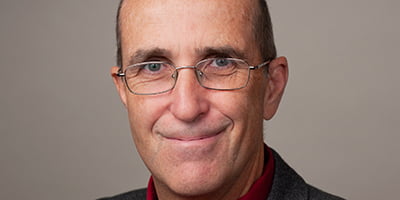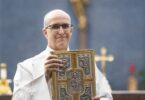
Leon Suprenant is the pastoral associate for administration in the office of the permanent diaconate. He also blogs at: www.archkck.org/blog.
by Leon Suprenant
One of my favorite “liturgical moments” takes place during the diaconate ordination Mass when the newly ordained deacon goes up to the bishop and kneels before him.
The bishop then places the Book of the Gospels in his hands, saying: “Receive the Gospel of Christ whose herald you have become. Believe what you read, teach what you believe, and practice what you teach.”
What a powerful moment, as the bishop entrusts the new deacon with the staggering authority to be a “herald” or messenger of Christ, richly symbolized before our eyes in the liturgy.
Deacons serve the church through a threefold ministry of the word, liturgy, and charity, always in close collaboration with their bishop. Perhaps we are familiar with the deacon’s liturgical ministry through our own experience of the wonderful deacons here in northeast Kansas. And most of us are aware that deacons, as living images of Christ the servant, are especially involved in works of charity and service.
But what about the ministry of the word? How are deacons “heralds” of the Gospel? In response, let’s consider three points.
(1) It’s not just about Mass.
Deacons do proclaim the Gospel at Mass and may be called to give the homily. That’s a significant responsibility, but it only scratches the surface of the deacon’s “ministry of the word.”
Deacons are members of the clergy, but they also typically have families, secular jobs, and civic responsibilities like the rest of us. They must be heralds of the Gospel right here, right now, in the midst of the world.
(2) Heralds are messengers, not editors.
Deacons may have their own opinions on a variety of issues, from gardening and foreign policy to what’s gone wrong with the Chiefs this season. However, as representatives of the church who have promised their obedience to Christ and to their bishop, they are servants of the Gospel.
Whenever a deacon preaches, the faithful have the right to expect that his words are the Gospel truth!
(3) Signs of contradiction.
Just as Old Testament prophets were rejected and the proverbial messengers are shot, so also deacons can expect opposition as faithful heralds of the Gospel. They are on the front lines of the new evangelization, boldly calling us to conversion and a new way of life in Christ.
Today, in the midst of unprecedented attacks on our religious liberty, on the right to life of the unborn, the terminally ill, and the aged, and on the institution of marriage itself, the deacon must make Christ’s voice heard.
The rite of ordination, quoted above, says it all. May deacons be shining examples to us all of faith, conviction, and Christian witness.

